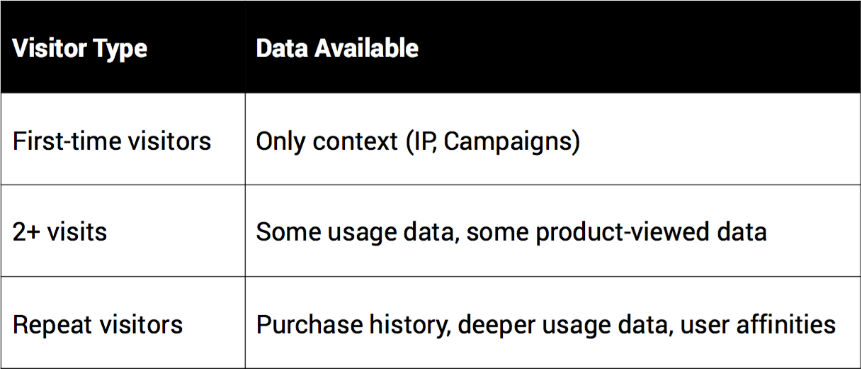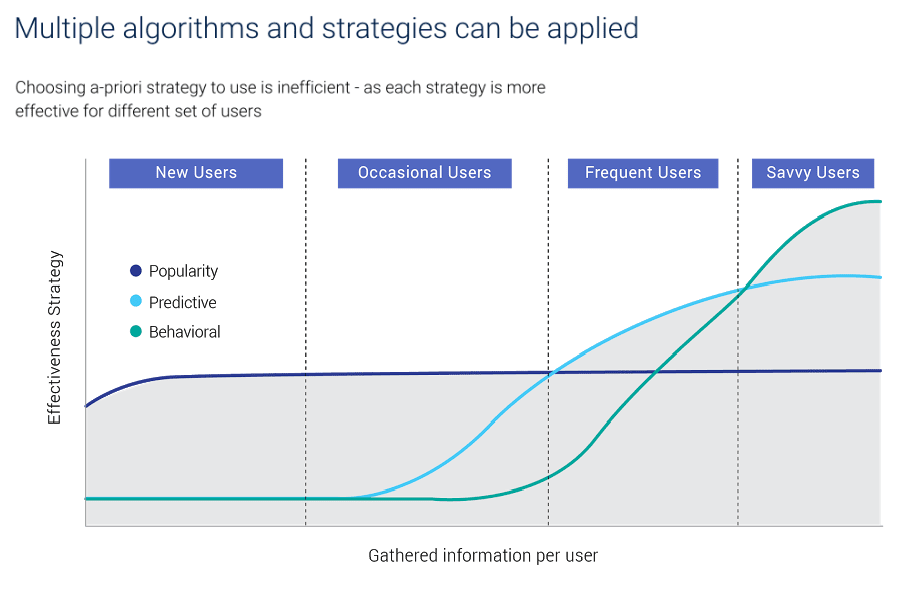 Online product recommendation has been around for several years, and nearly every retailer is employing some kind of recommendation strategy on their site. After all, the product shown is one of the most powerful factors influencing a purchase decision.
Online product recommendation has been around for several years, and nearly every retailer is employing some kind of recommendation strategy on their site. After all, the product shown is one of the most powerful factors influencing a purchase decision.
There are many types of recommendation algorithms available, including those based on popularity, situational context, and behavior. While retailers absolutely should be using recommendation strategies on their sites, they cannot simply pick a single recommendation strategy themselves. Instead they must let the customers’ position in the purchase journey influence the type of recommendation strategy that will yield the best results. To get the absolute best results, retailers must personalize their recommendation strategy.
To better grasp this need, let’s examine some of the most common strategies. The easiest recommendation strategy to implement is a class of popularity-based algorithms. For example, if you are shopping for movies online, you will most likely see a recommendation module that might show the most popular movies today.

You may also be familiar with situational algorithms, most famously adopted by Amazon. Situational algorithms work well when there is a lot of context about the particular product and enough purchase history around how this particular product has been purchased with other products. The most commonly used situational algorithm is “frequently bought together,” which, as the name implies, means just that — products that are frequently purchased together.

A third category of recommendation strategies is called behavioral strategies. These strategies not only take into consideration the context (say, the category or the product) but also the actual behavior of the users themselves — their past behavior, the items they have clicked on, the items they have purchased and much more.
Based on that knowledge, it would seem that behavioral algorithms are better than situational or popularity based algorithms. Unfortunately, that line of thinking is wrong.
There is no single universal option when it comes to recommendations, and different strategies should be applied to different users in real time. The position of the customer in the journey determines the amount of information available about the customer. The more a customer visits and interacts with a retail site, the more data becomes available to a retailer to deliver precise recommendations. The table below demonstrates the knowledge retailers might have at their disposal for different types of visitors.

Different strategies yield different results, and as the chart below illustrates, more information often leads to more effective recommendations. Of course, some of the most effective, such as behavioral strategies, don’t apply to new users. Therefore, retailers have to use strategies based on popularity in these situations. As savvy consumers deeply engage with a site, and go through multiple pages, they create multiple data points, allowing retailers to leverage behavioral strategies that will yield the right outcome.

There are many strategies available, and retailers need to let their machines choose the best one based on the signals they receive from their customers. There is a tendency to pick a recommendation strategy, usually via an A/B test, and deploy that strategy to all users. Delivering the right product recommendation requires retailers to maintain flexible strategies themselves, so that they can continue testing strategies to extract the highest value from recommendations and realize the highest marketing ROI.
Liad Agmon is the Co-Founder, Director and CEO of Dynamic Yield. He is a serial entrepreneur with rich experience as a startup founder and as a Fortune 500 executive. Agmon founded information security vendor Onigma (acquired by McAfee) and social search company Delver (acquired by Sears Holdings). Following Delver’s acquisition, he served as a VP of New Services at Sears Holdings and on the board of its Home Electronics and Outlets business units. Agmon served as an entrepreneur-in-residence at Bessemer Venture Partners and teaches at the Entrepreneurship MBA program in Tel-Aviv University and at the Zell Program of IDC Herzliya.




